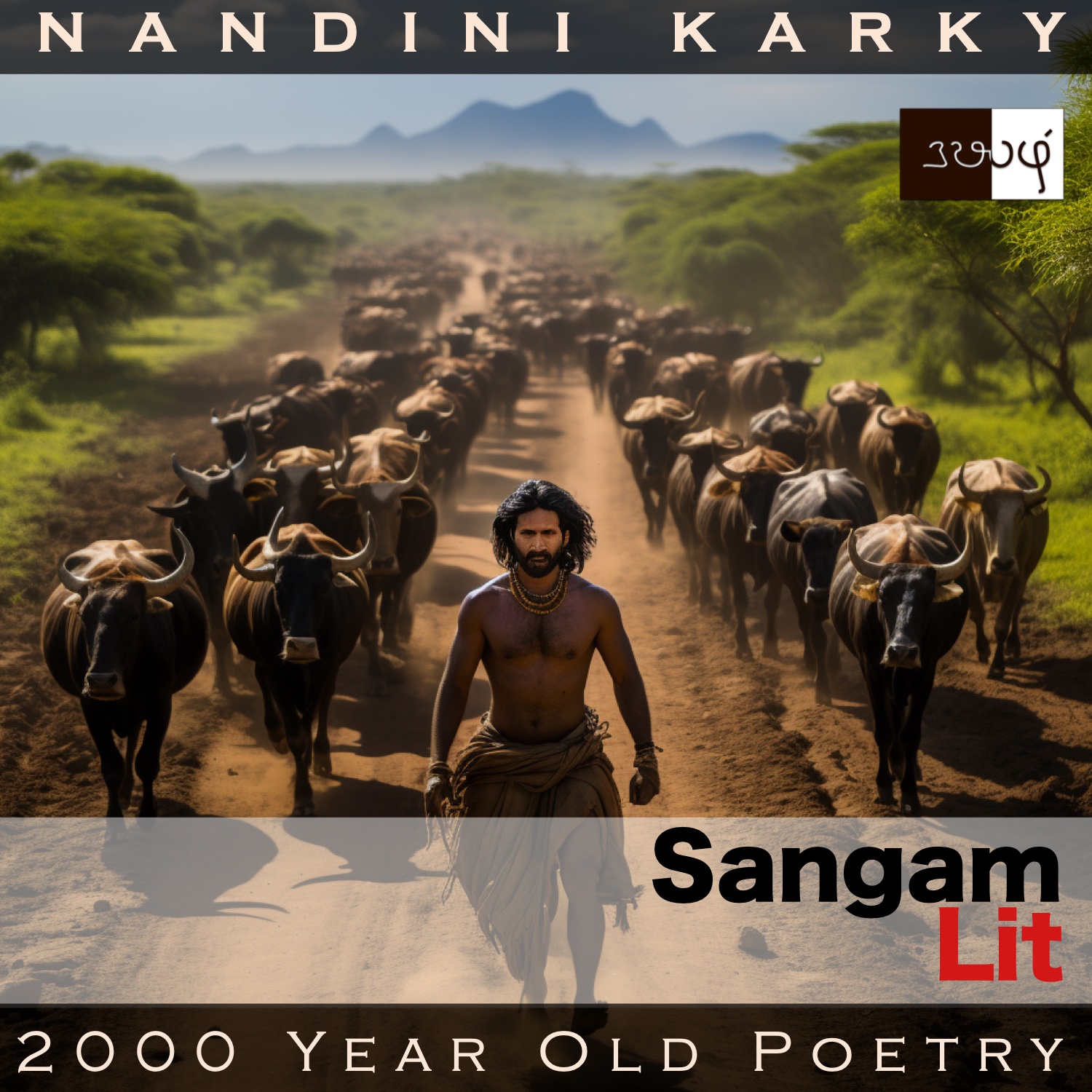Podcast: Play in new window | Download
Subscribe: Apple Podcasts | Spotify | Amazon Music | Android | iHeartRadio | TuneIn | RSS | More
In this episode, we perceive an interesting personality, as portrayed in Sangam Literary work, Puranaanooru 257, penned by an anonymous poet. The verse is situated in the category of ‘Vetchi Thinai’ or ‘Capturing Cattle’ and celebrates a leader’s quality of defeating his enemies.

செருப்பு இடைச் சிறு பரல் அன்னன்; கணைக் கால்,
அவ் வயிற்று, அகன்ற மார்பின், பைங் கண்,
குச்சின் நிரைத்த குரூஉ மயிர் மோவாய்,
செவி இறந்து தாழ்தரும் கவுளன், வில்லொடு,
யார்கொலோ, அளியன்தானே? தேரின்
ஊர் பெரிது இகந்தன்றும் இலனே; அரண் எனக்
காடு கைக் கொண்டன்றும் இலனே; காலை,
புல்லார் இன நிரை செல் புறம் நோக்கி,
கையின் சுட்டிப் பையென எண்ணி,
சிலையின் மாற்றியோனே; அவைதாம்
மிகப் பலவாயினும், என் ஆம் எனைத்தும்
வெண் கோள் தோன்றாக் குழிசியொடு,
நாள் உறை மத்து ஒலி கேளாதோனே?
Following the many songs on grief, we enter an entirely new territory with this song that describes the enmity between groups and their establishing supremacy over one another by the stealing of cattle. The poet’s words can be translated as follows:
“That someone, who is like a small pebble in a slipper, with strong legs, handsome abdomen, wide chest, fresh eyes, hair in the hue of ‘kuchchu’ grass on his head and sideburns extending down from his ears, and a bow in hand – Who might he be? He is to be pitied! When you think about it, he does not move far from this town; He doesn’t make the forest his fortress too; In the morning, he points in the direction of cows belonging to his enemies, quickly strategises, and with the skill of his bow, he changes the fate of those foes! While those cows stolen are huge in number, what could be their use to him for their presence is not felt as white lines on milk vessels and not heard as the sound of the curd churning rod, day after day?”
Let’s delve into the nuances here. In the style of a hero introduction song, the poet talks about the qualities and features of a man. But first, a unique simile to etch this character. The poet calls this person a stone in the slipper of another. Really? Is that a compliment, you may ask. Indeed, it is, because that slipper belongs to the enemy of the person being described, the poet clarifies. So annoying to his foes is the core thought here. Then the poet moves on to describe how this leader has a sturdy and well-built physique, be it his legs or chest, and talks about the person’s thick and rough hair in the hue and texture of grass and sideburns extending from the ears deep downward too. After doing a ‘mug shot’ of this leader with his words, the poet points to the bow in his hands and then says the person deserves our sympathy. What? We thought this song is going to be a crescendo praising this person but here we hear a jarring note inviting our pity.
Instead of giving a direct explanation, the poet goes on to further describe the man saying he is not one to travel far and wide and also he does not try to hide in the forest either. He would just look at the enemy’s cattle in the morning, and by evening, he would have planned a way to steal them and bring them over to their village, the poet adds. Even though those cows are many, many, they have no use for that leader, declares the poet, and explains the reason as that leader never gets to see milk lines on his vessels or hear the sounds of curd being churned all day. That’s why he’s to be pitied, the poet connects, implying that this leader is someone who does not hoard the spoils of his mission for himself but gives away all that he steals to others. Thus, we see another instance of how courage and generosity are like the two eyes to the Sangam poets. When they are praising one, they have to praise the other too! An interesting verse that reveals the priorities of a society in ancient times through the portrait of a successful leader as seen by them!




Share your thoughts...